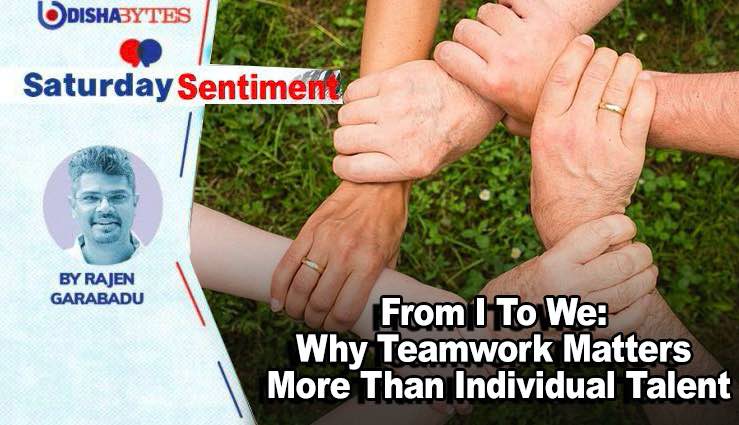From I to We: Why Teamwork Matters More Than Individual Talent

As a leader, do you believe it is all about YOU?
You think you make all the difference, and your team’s success stems from your efforts and accomplishments. If you are around, you expect nothing will go wrong. And you believe everything revolves around you.
Hear this! You could be a ROCKSTAR as a leader. But you are only as good as your team.
I have been in enough situations where having the right team has made all the difference. All things remaining equal – and here I mean the environment, tech and other resources, workflow, etc. – the individual in a given role can make or break the occasion. And no matter how talented an individual is, you need a strong team that feels like one.
“The strength of the team is each individual member. The strength of each member is the team.”
PHIL JACKSON
Over the years, I have learned that in a team, the key is to get the right composition.
How do you do that?
The Right Person for the Right Job
In the field of design, you need an eye for detail besides an evolved sense of aesthetics. Just learning the tools won’t help.
You can’t have square pegs in round holes.
You need to fit the role you are assigned. Often, it is here that things get messed up.
For instance, if you are an HR partner and you are not good with people, you’re in the wrong place. You need to know how to engage with them. Perhaps you are better suited for operations, in which case you should be moved there.
In customer-facing roles, knowing the art of conversation is a must. The client can be an external person or someone in-house. For a salesperson, the client is outside. For an HR partner, the client is within the workplace.
Swapping I for We
In a team sport, you’ve got to be a team player. ‘I’ does not belong here. You got to think as ‘we’ in a team.
“The ratio of We’s to I’s is the best indicator of the development of a team.”
LEWIS. B. ERGEN
As a leader, what you need is for most players (if not all) to put the interest of their team above their own. You need the players to back up each other, take the pressure off one another, play to each other’s strength, etc. That’s why teamwork is at a premium.
The Mix that Works
Borrowing a cricketing analogy, you need:
- at least one or two superstars. These big hitters can change the game when they enter the crease.
- a balanced team. You will need a few who may not have the ability to score big but can tire out the bowlers on the opposing side by standing their ground at one end.
- great fielders who can save certain boundaries and hit the wicket from anywhere they are, running out the opponent batsman.
- quick-running batsmen who can steal a single even when there are six or more fielders within a 30-yard circle. And convert the singles into two and doubles into three.
- players who will sacrifice their wicket running to the danger end if they find their partner – at the other end – better placed to win the game for the team.
The Trigger Behind this Piece
Earlier this week, I directed the biggest event of the year for the news network I work for.
It was an on-ground live-streamed, and televised event. I had to cater to the audience on location and the viewers watching remotely. The entire cast and crew played their part on my cue.
It was a 2-day event with 48 segments. There were multiple changes in a rolling, LIVE show. The challenge was to ensure the audience did not get to feel anything amiss.
How do you cater to last-minute requests and sudden changes in timings due to delayed guest arrivals and yet provide a seamless viewing experience to your viewers?
There is no secret formula. But you need to get a few things right.
- Everyone needs to know their job and do their best.
- You need a ‘team’ that acts and feels like one. All key personnel needs to be in sync – on one page.
- The communication lines need to be clear.
- There has to be a single chain of command.
- The key drivers in charge have got to be calm.
- And finally, you need to be in luck.
Know this:
A strong director can enhance the act or performance and manage to salvage a crisis situation. But even the best director in the world can’t do much if the cast and crew do not play their role responsibly.
Everyone must play their part well to enable the director to add value. Or else precious time and energy will be consumed to ensure each one does their job.
I will conclude how I started. As a leader, it’s not all about you.
Your team’s success depends on the strength of each individual member and the cohesiveness of the team. So, focus on getting the right people in the right roles, promoting teamwork, and clear communication.
Play your part well and watch your team soar to success!

Comments are closed.